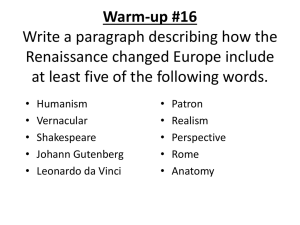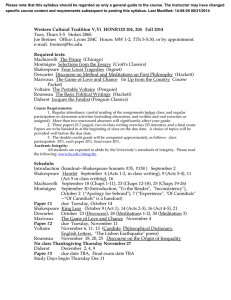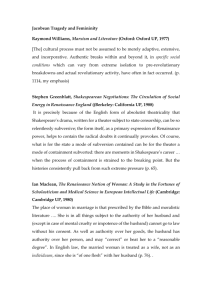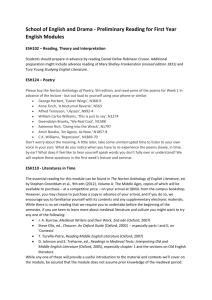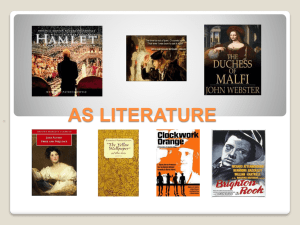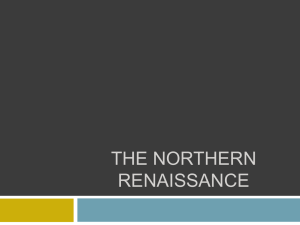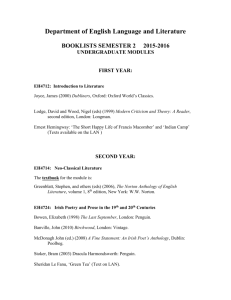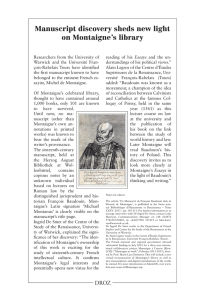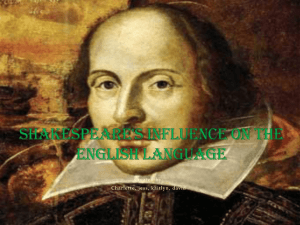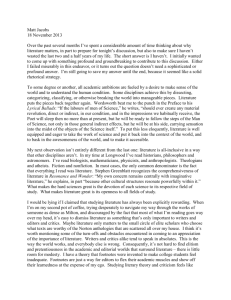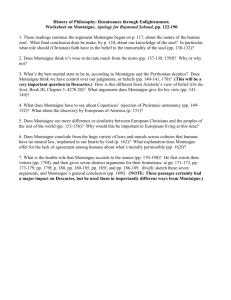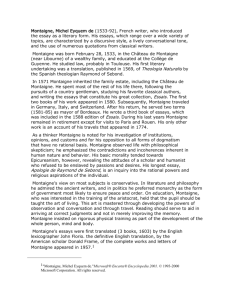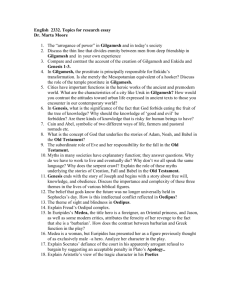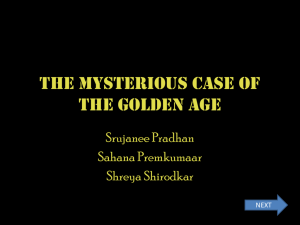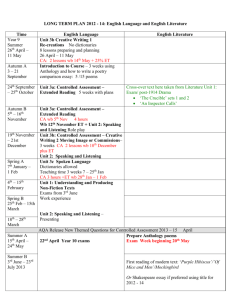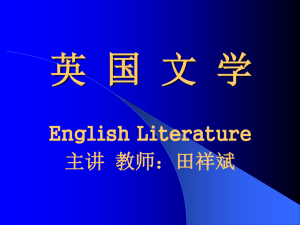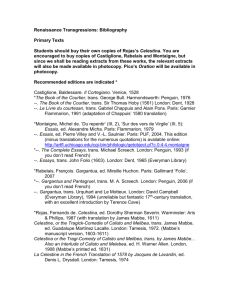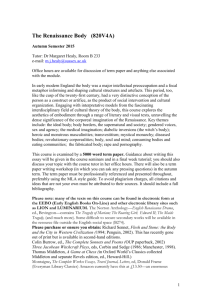Vacation Reading - University of Sussex
advertisement
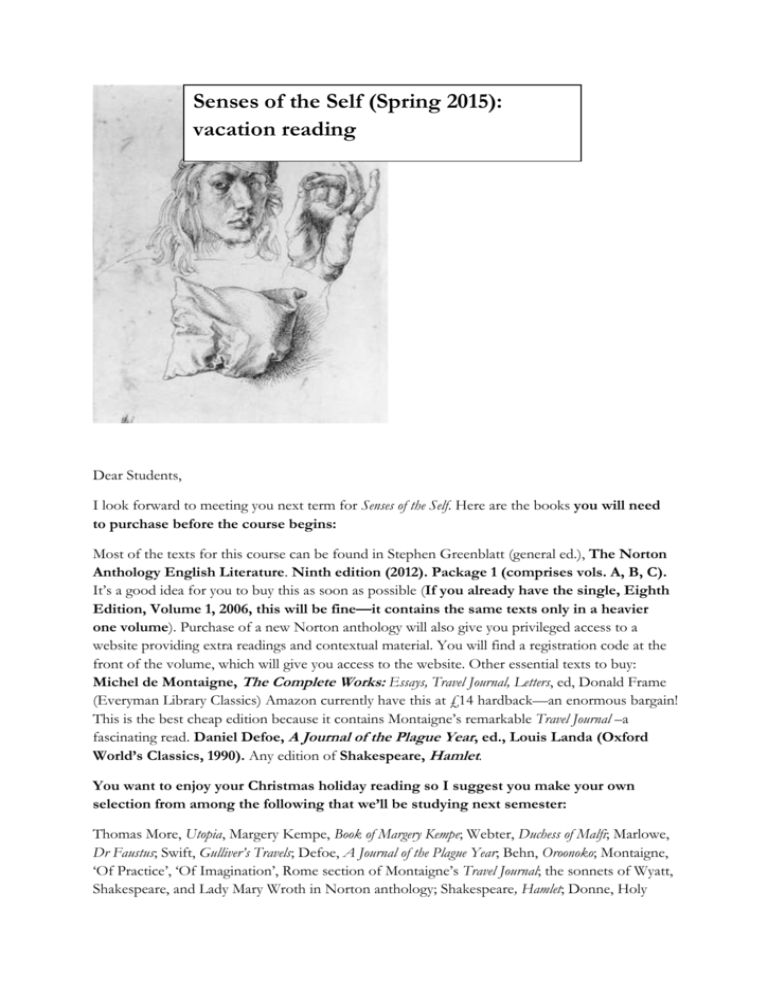
Senses of the Self (Spring 2015): vacation reading Dear Students, I look forward to meeting you next term for Senses of the Self. Here are the books you will need to purchase before the course begins: Most of the texts for this course can be found in Stephen Greenblatt (general ed.), The Norton Anthology English Literature. Ninth edition (2012). Package 1 (comprises vols. A, B, C). It’s a good idea for you to buy this as soon as possible (If you already have the single, Eighth Edition, Volume 1, 2006, this will be fine—it contains the same texts only in a heavier one volume). Purchase of a new Norton anthology will also give you privileged access to a website providing extra readings and contextual material. You will find a registration code at the front of the volume, which will give you access to the website. Other essential texts to buy: Michel de Montaigne, The Complete Works: Essays, Travel Journal, Letters, ed, Donald Frame (Everyman Library Classics) Amazon currently have this at £14 hardback—an enormous bargain! This is the best cheap edition because it contains Montaigne’s remarkable Travel Journal –a fascinating read. Daniel Defoe, A Journal of the Plague Year, ed., Louis Landa (Oxford World’s Classics, 1990). Any edition of Shakespeare, Hamlet. You want to enjoy your Christmas holiday reading so I suggest you make your own selection from among the following that we’ll be studying next semester: Thomas More, Utopia, Margery Kempe, Book of Margery Kempe; Webter, Duchess of Malfi; Marlowe, Dr Faustus; Swift, Gulliver’s Travels; Defoe, A Journal of the Plague Year; Behn, Oroonoko; Montaigne, ‘Of Practice’, ‘Of Imagination’, Rome section of Montaigne’s Travel Journal; the sonnets of Wyatt, Shakespeare, and Lady Mary Wroth in Norton anthology; Shakespeare, Hamlet; Donne, Holy Sonnets; Aemilia Lanyer, Salve Deus; Chaucer, Pardoner’s prologue and tale; Margaret Cavendish, The Blazing World. Here is the outline and reading for week 1: Introduction: Ideas of the Self What do we mean by the self? What are the key questions we’ll be asking about selves and their representation on this course? The purpose of this class is both to frame, and to open up the field we’ll be studying (as well as introducing you to some of its complexities) so that you’ll begin to gain a sense of the areas that your assessments might address. Your attention will be drawn to the seminal texts and theories that have shaped modern ideas of the self in Western culture. Essential preliminary reading: Shakespeare’s Hamlet and Michel de Montaigne, ‘Of Practice’. Roy Porter, ed., Rewriting the Self: Histories from the Renaissance to the Present (London and New York: Routledge, 1997., especially pp. 1-57. This is the most important secondary text for this course. You can buy it as a Google e-book. The initial chapter is available on your Study Direct site for this week. In the seminar we shall discuss short extracts (photocopies provided in class) from: Rene Descartes, Discourse 4, ‘Discourse on the Method of Properly conducting One’s Reason and of seeking the Truth in the Sciences’, 1637 (from Descartes, Discourse on Method and the Meditations, trans. F.E.Sutcliffe (London: Penguin, 1968); and The Confessions of Saint Augustine (from Augustine, Confessions of Saint Augustine, trans. F.J.Sheed (Indiana: Hackett Publishing, 1992). We shall also consider self-portraits by the artists Durer, Rembrandt and Catherine van Hemessen Further reading: Jerrold E. Seigel, The Idea of the Self (Cambridge: Cambridge University Press, 2005); Jakob Burckhardt, The Civilization of the Renaissance in Italy [1860], trans. G. S. Middlemore (Harmondsworth: Penguin, 1990); Stephen Greenblatt, Renaissance Self-Fashioning: from More to Shakespeare (Chicago: University of Chicago Press, 1980); Joseph Koerner, The Moment of SelfPortraiture in German Renaissance Art (Chicago: University of Chicago Press, 1993; John J. Martin, Myths of Renaissance Individualism (Basingstoke: Palgrave Macmillan, 2006). Have a very good Christmas! My very best wishes, Prof Margaret Healy (m.j.healy@sussex.ac.uk)
